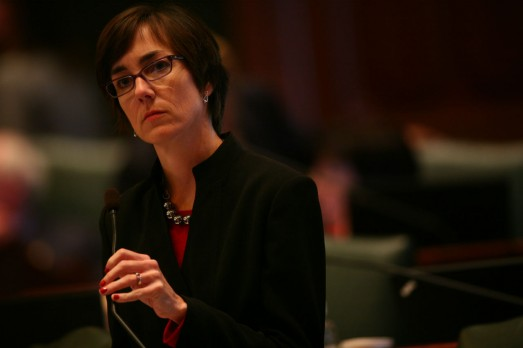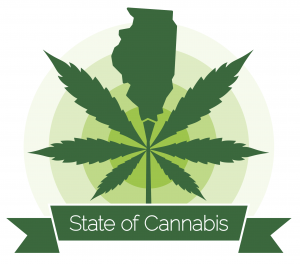Update: Where Cannabis Legislation Stands

State Rep. Kelly Cassidy, a lead sponsor on a proposal to legalize cannabis in Illinois, says home grow has been the most contentious topic in the working group meetings. Office of Rep. Kelly Cassidy
The idea of a legal recreational program looks very likely for Illinois especially with Gov. J.B Pritzker already allocating funds into next year's budget from licensing fees. Lawmakers are completing a series of behind-closed-doors meetings, but bill language has not been filed.

This story is part of a weeklong series from Illinois public radio stations focusing on the potential impact of marijuana legalization.
Reporter Jaclyn Driscoll sat down with lead sponsor state Rep. Kelly Cassidy (D-Chicago) to get an update.
Reporter: Recreational cannabis is something you've been talking about for years, but it seems to be heating up this session especially. How have negotiations been going?
Cassidy: The discussions have been great. Very productive, folks are thoughtful and offering ideas, criticism, suggestions. I've felt really good about it. In particular, it has validated our approach to this from the start. This long deliberate process that Sen. Steans and I have embarked on. There weren't any curveballs that we didn't know were out there. It makes me feel good about the conversations we've had leading up to this to get us ready for this time.
Reporter: Last time we spoke, you didn't have details on the tax dollars. Are there any details you can share now with how it will be taxed or where the tax money may go?
Cassidy: Sure. Again, we don't have a final product yet. Although we anticipate that we're going to get there pretty soon. There is general understanding of that concept, that if you put the money first you end up with less money and a worse policy. So, we've been walking through, sort of, what other states have done, how they've done it, what levels they've had, the states that have had to go back and revisit their tax structures. So, now we're really in the place of figuring out where those levers are and how it will be constructed. And, lots of conversation about where the money is going to go and how it will be distributed. As we anticipated and to nobody's surprise, ever, those conversations about where the money's going to go have been some of the most popular working group meetings. Again, no curveballs. We've had a pretty thorough discussion up to this point so we get what some of the local government issues are, we get what some of the health community issues and how we can navigate that to make sure we get something that works for everybody.
Reporter: If or when a recreational cannabis bill does pass, what is it going to look like in Illinois?
Cassidy: Ideally, it'll look like the state of Illinois. There will be access available to folks all across the state so we don't have those challenges that we've seen in other places of either undue concentration or complete lack of access. Right now, we know that the 55 operating dispensaries will not be enough on day one to meet demands, so we're working to address that and making sure that they don't end up all concentrated in one area. We're examining the best path to regulate production so that we don't have overproduction, like you've seen in states like Oregon and Washington that are struggling with, sort of, a gray market emerging of product leaking out into the street markets there and other states. But, also that we don't have undersupply so patients don't have access to the medicine they need.
Reporter: Home grow. That's a big topic, for law enforcement especially. But, it's also important for medical patients across the state with easier access. How are you navigating that?
Cassidy: That has been some of the more challenging conversations. Law enforcement has latched onto this as the thing that they're so deeply concerned about. They raise a parade of horribles that will happen and I keep going back to this issue, with any "this terrible thing will happen" kind of scenario that people play out. The reality here is we know that there are north of 750,000 people who regularly use this product in the state of Illinois today. They buy it on the street market, they are funding cartels and street gangs, they are getting a product that isn't tested, that isn't regulated, that isn't cleared in any way. We're pretending it's not happening. People are growing their own now. It's not going to change; usage rates don't change in states that legalize. So the challenge around home grow is another example of that. This isn't really going to change the way the world is operating today.
Reporter: I understand this is a massive piece of legislation, but if there was one goal in passing recreational cannabis, what is it?
Cassidy: I've said this before. I want to pass the gold standard for cannabis legislation that the rest of the country can follow. That means a model that taxes at a level that allows the industry to grow, that allows patients and users access in a way that gets them into the legal markets, that creates an industry and allows an industry to grow that looks like the state of Illinois, that looks like communties we come from.
Reporter: Since we did see Gov. Pritzker include some funding in next year's budget, do you feel additional pressure to get it passed?
Cassidy: No, I feel like this is the path we've been on and we've walked this path pretty calmly. We're going to try to finish that way too.
This week, public radio station across Illinois are tackling a once taboo topic.
There are several current and emerging markets for cannabis-related products. Medical marijuana is already legal in the state, farmers are gearing up to grow industrial hemp, and lawmakers could consider a measure to legalize the recreational use of marijuana this year. Whether or not recreational use is legalized, the business of cannabis is already established in the Land of Lincoln, and our reports are intended to bring you information related to these efforts.

